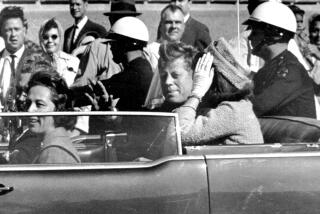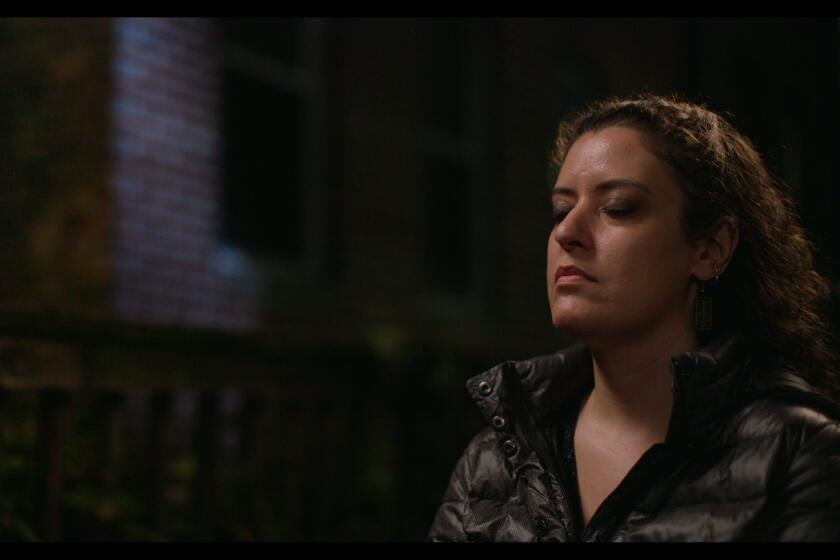Review: ‘Chappaquiddick’ is a murky exploration of an infamous political scandal
If you lived through the 1960s, no one has to tell you what the word “Chappaquiddick” means.
It’s an island off the coast of Massachusetts where, on July 18, 1969, Sen. Ted Kennedy of Massachusetts drove a car off a small bridge into a pond, killing its occupant, a young woman named Mary Jo Kopechne. Headlined the always to the point New York Daily News: “Teddy Escapes, Blonde Drowns.”
If adversity is a test of character, this is one the senator failed. As detailed in this film starring Jason Clarke as Kennedy and Kate Mara as Kopechne, Kennedy did not provide convincing explanations for many of the night’s actions, including a delay of between eight and 10 hours in reporting the accident.
Though charges of involuntary manslaughter were theoretically possible, Kennedy, likely because of the clout his family had in Massachusetts politics, was convicted only of leaving the scene of an accident.
While the incident effectively ruined any hopes Kennedy had of convincingly running for the presidency like his brothers Robert and John, he ended up serving more than 40 years in the Senate and becoming a highly respected figure.
As written by Taylor Allen and Andrew Logan and smoothly directed by John Curran (“Tracks,” “The Painted Veil”), “Chappaquiddick” has a pleasantly pulpy feeling to it, a cross between a political thriller and a daylight film noir.
But solidly made though it is, “Chappaquiddick” has difficulty overcoming a pair of built-in frustrations.
First, despite a screenplay based on the nearly 1,000-page transcript of the 1970 Massachusetts Supreme Judicial Court inquest, no one can really know what happened from start to finish in Chappaquiddick. And the inevitable fictionalization makes one wonder whether particular on-screen dialogue and incidents really happened or are just well-informed conjecture.
Also, in the final analysis “Chappaquiddick” is the story of a weak man. Maybe someone who had deep-seated reasons for that weakness, but still a not particularly appealing individual whose actions frustrate rather than draw us in.
Playing a part here is the casting of Jason Clarke as Kennedy. Though he is an excellent actor, Clarke, in films from “The Great Gatsby” through “Mudbound,” often plays characters who lack moral fiber, and casting him as Teddy, the physical resemblance notwithstanding, puts a bit of a thumb on the scale.
Still, “Chappaquiddick” does put a certain amount of effort into trying to present Kennedy sympathetically, into showing how difficult it was to have a trio of brothers who were heroic, charismatic and smart, leaving the role of screw-up to him by default.
We also get to see what it was like to have an overbearing ogre like Joseph Kennedy (a deft Bruce Dern cameo) for a father, a man who, even hampered by a stroke, could strike fear in all and sundry.
Set up as a foil to the obtuse Kennedy is his cousin Joe Gargan (the usually comic Ed Helms), the sensible, competent family go-to guy used to smoothing over problems who finds these waters too choppy to calm.
It’s Gargan who sets up the party on Chappaquiddick with the “boiler room girls,” the women on Robert Kennedy’s campaign secretarial staff. Kopechne was one of this group, and the film treats her with great respect and presents her relationship with Ted as chaste and above board.
The two left the party together, and though a combination of drinking and driving too fast likely caused the accident, in the final analysis no one knows why the car went over the bridge, why Kennedy escaped and she did not, or why he waited so long to report the accident.
Trying to be fair, “Chappaquiddick” portrays Kennedy as dithering between a reluctance to accept responsibility and remorse but finally ceding authority to a coverup task force led by Robert McNamara (Clancy Brown), who seethes that “the Bay of Pigs was a better run operation.”
Despite the film’s claims of neutrality, by having good guy Gargan push Kennedy to resign it clearly signals its feeling that that would have been the moral thing to do. While “Chappaquiddick” sheds some light on the proceedings, the film leaves us feeling, as Kennedy intimate Ted Sorensen (Taylor Nichols) puts it, “history has the final word on these things,” not Hollywood.
------------
‘Chappaquiddick’
Rating: PG-13 for thematic material, disturbing images, some strong language and historical smoking
Running time: 1 hour, 41 minutes
Playing: In general release
More to Read
Only good movies
Get the Indie Focus newsletter, Mark Olsen's weekly guide to the world of cinema.
You may occasionally receive promotional content from the Los Angeles Times.











